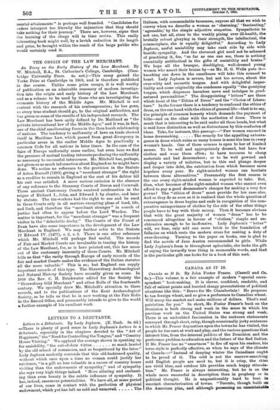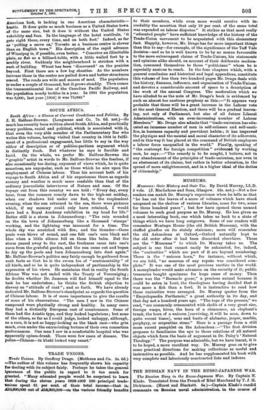for amiability, "the out-of-date virtue so mach lauded by the
old school of romancers, and so bespattered by the later." Lady Jeph son modestly contends that this old-fashioned quality, without which once upon a time no woman could justify her existence, "is a gift no less valuable in a career of country house visiting than the endowments of sympathy," and of sympathy she says very high things indeed. "More alluring and enchant- ing than even beauty is the subtle influence of sympathy. It has, indeed, enormous potentialities. We have all, at some period of our lives, come in contact with the perfection of physical endowment, which yet has left us cold and ttnmoyed. . . . The 'agreeable,' by the simple adjective simpatica. Sympathetic to not one, but all, since to the weakly pining over ill-health, the brutally robust glorying in their strength, the intellectual, the commonplace, she is equally delightfuL" According to Lady Jephson, useful amiability may take rank side by side with beatific sympathy. And the cleverest girl need not be ashamed of practising it, for, "as far as one can see, there is nothing essentially antithetical in the gifts of amiability and brains." We hope all the brusque, disobliging, well-dressed young
women who assert their brains by—as Mr. H. G. Wells puts it— knocking one down in the omnibuses will take this counsel- to heart. Lady Jephson is severe, but not too severe, about the over-witty and sarcastic tongue. And with delightful impar- tiality and some originality she condemns equally "the gossiping tongue, which dispenses harmless news and indulges in good- natured personalities." The disappointing "letters" are those which treat of the "Ethics of Dress" and the "Choice of Litera- ture." In the former there is a tendency to confound the ethics of dress, on the one hand with the ethics of general life—that is to say, the principle of common honesty which demands the payment of bills—and on the other with the aesthetics of dress. There- is much that is interesting to be said under all these heads, but what is said loses distinction as well as distinctness by this confusion of ideas. Take, for instance, this passage:—"Few women succeed in home dressmaking The remedy for the appalling extrava- gance in dress which ruins so many homes is none the less in every woman's hands. One of three courses is open to her of limited means. To be well and appropriately dressed, but have few clothes and wear them often; to have recourse to cheap materials and bad dressmakers ; or to be well gowned and display a variety of toilettes, but to this end plunge deeper and deeper into debt, the extrication from which becomes more hopeless every year. No right-minded woman can hesitate between these alternatives." Presumably the first course is the one every right-minded woman is expected to take. But, then, what becomes of the right-minded woman who cannot even afford to pay a good dressmaker's charges for making a very few gowns ? The "ethics of dress" must provide for her case also. And so they do as soon as it is realised that the whole question of extravagance in dress begins and ends in recognition of the com- parative unimportance of clothes by the side of the other things people have to buy with their money. Then it becomes obvious that with the great majority of women "dress" has to be renounced altogether in favour of "clothes," simple and un- obtrusive enough to be inoffensive. Lady Jephson's "letter" will, we fear, only add one more brick to the foundation of fallacies on which rests the modern craze for making a duty of over-dressing. Turning to the paper on books, one is glad to find the novels of Jane Austen recommended to girls. While Lady Jephson's form is throughout aphoristic, she lacks the gift of saying the inwardly true thing in memorable words, and that is the particular gift one looks for in a book of this sort.
CANADA AS IT IS.
Canada as It Is. By John Foster Fraser. (Cassell and Cu. 6s.)—This volume is a fair example of modern "special corre- spondent" book-making. It is clever, confident, readable, and full of salient points and hurried slangy presentations of political situations like this : "Bravo for Mr. Chamberlain ! He proposes to tax foreign wheat, and so give a preference to Canadian wheat. Will scoop the market and make millions of dollars. That's real patriotism for you." In short, Mr. Foster Fraser's book on the Dominion is both streng and weak in the sense in which his previous work on the United States was strong and weak. There is an undoubted fascination in the cocksure statements conveyed through short, crisp, though occasionally jerky sentences in which Mr. Fraser dogmatises upon the towns he has visited, the people he has seen at work and play, and the various questions that interest him, from the internal politics of the Dominion and the preference problem to education and the future of the Red Indian. If Mr. Fraser has no " smartness " to fire off upon his readers, his terse style is perfectly effective, as when he says of the climate of Canada :—" Instead of denying winter the Canadians ought to be proud of it. The cold is not the marrow-searching cold English people are used to, but it is crisp, the skies are vivid blue, and outdoor life provides much happy stimula- tion." Mr. Fraser is always interesting, but he is on the whole more successful in description than in prophecy or in political thought. He is unquestionably hard to beat in succinct characterisation of towns. "Toronto, though built en the American plan, and although possessing an unmistakable American look, is lacking in one American characteristic— hustle. It does quite as much business as a United States town of the same size, but it does it without the United States volubility and fuss. In the language of the hotel vestibule, 'it gets right there, every time, and on both feet.' Indeed, as far as 'getting a move on,' Toronto as a business centre is slower than an English town." His description of the rapid advance of Winnipeg is, if possible, even better. "Conceive an illimitable plain, as flat as a billiard-table, with a little walled fort by a muddy river. Suddenly the neighbourhood is stricken with a rush of building. Wheat has been ' discovered ' on the prairies beyond. First there are a few log shanties. As the numbers increase those in the centre are pulled down and better structures reared. The roads are wide and masses of mud. The population is' under a couple of thousand, but it grows steadily. Then comes the transcontinental line of the Canadian Pacific Railway, and the population nearly trebles in a year. In 1881 the population was 6,000; last year [1904] it was 75,000."
SOUTH AFRICA.
Routh Africa : a Glance at Current Conditions and Politics. By j. H. Balfour-Browne. (Longmans and Co. 7s. 6d. net.)—So much has recently been written about South Africa, and practically every problem, racial and political, which is associated with it, that even the very able member of the Parliamentary Bar who writes this volume, having visited that country in 1904 in fulfil- ment of a professional engagement, has little to say in the way either of description or of politico-partisan argument which is distinctly fresh. But whatever he says is forcible and lucid. On the whole, we prefer Mr. Balfour-Browne the "graphic" artist in words to Mr. Balfour-Browne the fearless, if also occasionally too daring, exponent of views which, he is quite conscious, are unpopular, such as those which he airs upon the employment of Chinese labour. Thus his account both of his voyage to South Africa and of his experiences there as regards scenery and weather is much more readable than that of the ordinary journalistic interviewer of Nature and man. Of the voyage out from this country we are told : "Every day, every hour, from the common comely dawn to the high-set midday, when our shadows hid under our feet, to the resplendent evening, when the sun returned to the sea, there were pictures which, if my memory could only have retained, I would have had a Royal Academy exhibition in my head for life." Better still is a storm in Johannesburg : "The rain sounded on the tin town of Johannesburg like a thousand ' stamps ' working, and the lightning was incessant for a time. The whole sky was scratched with fire; and the thunder—these peals were blows of sound, and one felt one's ears black and blue when a little silence fell on them like balm. But the storm passed away to the east, the freshness came into one's room from the grateful garden, and the sun came out and began to dry up the pools and turn Johannesburg into dust again." Mr. Balfour-Browne's politics may fairly enough be gathered from such facts as that he is the sworn foe of " sentimentality " of all kinds, and so he is quite independent of partisanship in the expression of his views. He maintains that in reality the South African War was not ended with the Treaty of Vereeniging ; he doubts whether Dr. Jameson will find himself equal to the task be has undertaken ; he thinks the British objection to slavery an "attitude of cant "; and so forth. We have already indicated Mr. Balfour-Browne's standpoint as regards the question of Chinese labour. It is of more importance to give the results of some of his observations. " The men I saw in the Chinese compound were physically strong and healthy. In many rases they had a distinctly European cast of countenance. Some of them had the Asiatic type, and they looked lugubrious ; but none of the others, so far as I could judge, looked unhappy, although, as a race, it is not so happy-looking as the black race—who grin much, even under the excruciating torture of their own concertina performances. One man I saw in a comfortable hospital who was apparently opium-drank. There were few cases of disease. The police—Chinese—in khaki looked very smart."



























































 Previous page
Previous page